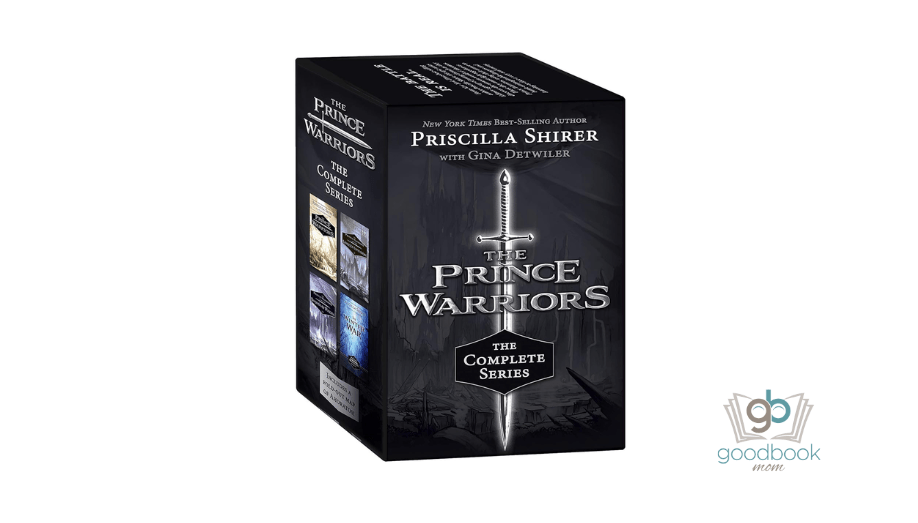
Summary
The Prince Warrior trilogy is a transparently allegorical adventure story about a group of kids who are drawn into the secret world of Ahoratos, where they are given armor and learn from their mysterious guide Ruwach how to fight battles they never before realized existed – both in Ahoratos and in their own world as well.
Reading Level: 9-14
Mom Thoughts
Overall, I really liked this series. All the books are based on Ephesians 6:10-18 and contain many open allegorical allusions to the realities of spiritual warfare as described in Scripture.
Seemingly designed especially for boys, the Prince Warrior books carry adventure, incredibly redemptive storylines, and model excellent character lessons like humility, mercy, compassion, and courage. One of my favorite things about the series is that negative behaviors are portrayed as such and followed by consequences – and usually, positive growth of the character. Most of the parents are portrayed positively (or if not, at least sympathetically,) and several offer assistance and wisdom that helps the boys as they learn how to become Prince Warriors. The conflicts and dangers the kids face often mirror spiritual reality, and even the names of characters or locations in Ahoratos hold a deeper meaning in Greek or Hebrew (Ahoratos=Unseen, Ruwach=breath/wind, etc.)
When the children receive their mission instructions, it’s often a verse from Scripture (though not identified as such) that they must then work out wherever their mission takes them. Sometimes this wanders into eisegesis rather than exegesis (as Shirer’s teachings often do,) but for the most part, the applications stayed fairly true to the biblical context.
It’s interesting that unlike other Christian allegories, this series personifies God the Holy Spirit (Ruwach) rather than Jesus. The salvation narrative is not the focus: spiritual warfare and sanctification are. Though unusual, overall I found it worked and would likely help older children think through the realities of spiritual battles more concretely, if not very completely.
Now for the main drawbacks… The pacing felt a little off, some characters remain flat (the girls in particular,) and the story is very transparently allegorical, almost to a fault. But my biggest criticism is that the Holy Spirit character, Ruwach, is often vague and unclear – and sometimes the children meet with disaster after (understandably) misinterpreting his instructions. Though the kids talk about how Ruwach likes them to “figure things out for themselves,” this was occasionally taken way too far, seemingly implying that God’s commands are incomplete or confusing, and the pressure is on us to guess accurately what He means. It didn’t necessarily negate the other helpful spiritual lessons or parallels for me, but it’s something I plan to talk through with my son when we read them.
Language:
Kids talk about others negatively, with words like annoying, snotty-nosed, etc.
Poneros (the villain) talks of wanting to kill the Prince Warriors and calls them weak, pathetic, etc.
Other words that occur 2-3 times include idiot, scaredy cat, dumb, stupid, heck, butt, and fool.
Questionable Behaviors:
Brothers and friends bicker and fight at times. Kids are sometimes dismissive, disrespectful, deceptive, or disobedient to parents or other authority figures. Some characters express jealousy or openly desire popularity. Bri in particular starts out very materialistic, vain, and consumed with others’ opinions of her. All these behaviors are portrayed negatively and are followed with consequences and/or growth.
There is a bully who pushes Manuel and makes fun of him.
There’s a fair bit of non-graphic peril and fighting: battles against Forgers and Glommers, dragons fighting, a wolf stalking the kids in a dream, and a battle near the end of the trilogy with the main villain where one minor supporting character dies.
The kids sometimes do things against common sense (stepping over a ledge, etc.) under the reasoning of feeling like Ruwach wants them to, but without his explicit instruction to do so – the spiritual parallels of which may carry dangerous implications.
Sexual Content:
There is talk a couple times of a boy being cute, girls blushing, talk of a “crush,” and one innocent kiss on the cheek (as a thank you for a rescue.) A college student is said to be “smitten” with one of the warriors. Nothing graphic or overtly sexual.
Evan talks once about wanting the girls to look at him with awe.
Other Things to Note:
Some heavy content is discussed regarding parents or caretakers, including the death of a parent, unbelieving parents, divorce, abandonment by a parent, and a grandparent having a stroke. One character is raised by her grandparents because her parents are “not around.”
Bri mentions helping other girls decorate for a dance party.
The kids sometimes misapply Scripture, though it’s not named as such, using eisegesis rather than exegesis (i.e. using Jeremiah 29:11, Joshua 1:9 to apply to their own spiritual crises.)
Ruwach warns the children from time to time via visions or dreams. Ruwach visits Poneros’s throne room – unlike Scripture, where that is reversed.
The kids cry out to Ruwach (the Holy Spirit) for help and often “hear His voice” in their minds – sometimes reminding them of their instructions (Scripture) but not always. The Source (allegory for God) is largely impersonal, almost force-like, and Jesus is only vaguely alluded to (i.e. The Water, the way into the cave.)
After correctly interpreting a vaguely worded “test” from Ruwach, Levi receives an additional gift – being able to see spiritual realities that the other kids cannot – which seems to go against the overt theme of “You have everything you need.”
In the third book, Poneros orders a weaver to build him a human body from the blood of a Prince Warrior and “bleeds” gray when cut in battle, ultimately shedding the human body and returning to his devil-like form.
Good Book Mom does not endorse this book as Priscilla Shirer teaches openly to men and has many unbiblical teachings.
This review was written by Good Book Mom contributor, Keri. To learn more about Keri, click HERE.

